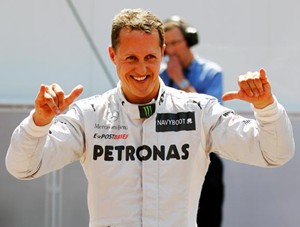 | « Back to article | Print this article |
Michael Schumacher announced his retirement from Formula One for the second time and at the age of 43 on Thursday after failing to rekindle his old Ferrari magic in a disappointing comeback with Mercedes.
The team had already announced last week that the seven-times World champion, winner of a record 91 races in a career that started in 1991, would be replaced by McLaren's Lewis Hamilton for the start of the 2013 campaign.
Schumacher told reporters, packed into the confined space of the tented Mercedes hospitality at the Suzuka circuit ahead of Sunday's Japanese Grand Prix, that his decision came as a relief.
"I have decided to retire by the end of the year, although I am still able and capable to compete with the best drivers that are around," he declared, reading from a statement.
"But at some point, it is good to say goodbye. And that is what I am doing here... and it might this time even be forever," he smiled.
 Schumacher's first retirement came at the end of 2006, after he had won five titles in a row with Ferrari from 2000 and two with Benetton in 1994 and 1995.
Schumacher's first retirement came at the end of 2006, after he had won five titles in a row with Ferrari from 2000 and two with Benetton in 1994 and 1995.
That departure proved premature, with the most successful driver in the 62-year history of the sport unable to resist the allure of a return with Mercedes when the Stuttgart-based manufacturer bought the title-winning Brawn GP team in 2009.
The move reunited him with friend and former Ferrari technical director Ross Brawn, now the team principal, but together they were unable to roll back the years and regain the heights of old.
ONE PODIUM
Schumacher has been on the podium only once in his last three seasons, a third place in Valencia this year, and has retired from half of the 14 races so far in 2012. His last win was with Ferrari inChina in 2006.
The veteran has also had some embarrassing crashes, including one in Singapore that had even loyal German followers questioning his eyesight and means he will have a 10-place penalty on the starting grid for Suzuka.
Schumacher, his voice occasionally cracking slightly with emotion as he spoke in front of a crescent of television cameras, said he now wanted to enjoy his last six races.
The first of those will be on Sunday at a classic circuit that ranks as one of his favourites and where, in what now seems like the distant past, he celebrated long into the night after winning two of his championships.
Thursday's decision might be seen as an inevitable consequence of Hamilton's signature on a Mercedes contract but there had been some lingering speculation that Schumacher could try to battle on with a lesser team such as Sauber.
The German, given a standing ovation after concluding his statement, made clear that he had no such intention and spoke of his relief and sense of freedom in deciding to walk away once the season ends in Brazil in November.
"During the past month I was not sure if I still had the motivation, and energy which is necessary to go on," he explained.
"It is not my style to do something that I'm not 100 percent feeling for. With today's decision I feel released from those doubts.
"It is without doubt that we did not achieve our goals... but it is also very clear that I can still be very happy about my overall achievements in the whole time of my career."
Schumacher, who was restless and searching for a role after retiring from Ferrari and did not say what he might now do after leaving Mercedes, said he had learned a lot about himself in the past six years.
One thing was that losing could be "both more difficult and more instructive" than winning, something he recognised he had lost sight of in his earlier years when success came almost for granted.
Debate will rage on for decades among F1 fans about where the German ranks in the pantheon of greatness, with Schumacher also one of the most controversial of racers, but Brawn had no doubt about where he stood.
"I think he's the greatest racing driver of this century," the Briton said.
Photograph: Mark Thompson/Getty Images
